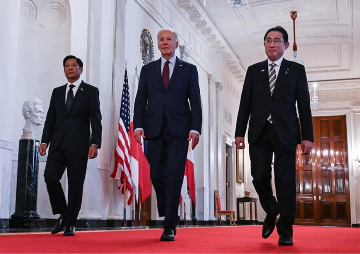
With President Gotabhaya Rajapaksa dissolving Parliament at midnight last night, as expected, Sri Lanka is all set for fresh parliamentary polls on Saturday, 25 April. While this could throw the nation back on the election mode after the presidential polls of November last – with one more to this year – this one can also put an end to the parliamentary uncertainty and delay, along with inevitable horse-trading until a new government is sworn in.
There was no doubt in anyone’s mind that the Parliament would be dissolved at the first opportunity that Constitution has made available to President Rajapaksa since his assuming office with a combined Opposition-majority Parliament. Originally, the Constitution empowered the President to dissolve Parliament any time after the House completed one year. Under the much-touted 19th Amendment passed by the previous regime, this period was restricted to the last six months of the Parliament’s elected, five-year term.
The lack of parliamentary majority however did not preclude him from swearing in elder brother and former President Mahinda Rajapaksa as Prime Minister, on assuming office. The political rivals of the ruling Rajapaksa clan in the Opposition UNP, the nation’s GoP had set a bad precedent, on incumbent Mahinda Rajapaksa’s defeat in 2015. Thus, the UNP and their electoral and post-poll allies from that election lost all moral authority to challenge the replacement of incumbent Ranil Wickremesinghe, with Mahinda Rajapaksa as Prime Minister.
Not having an absolute majority in Parliament did not deter the ruling SLPP, founded, headed and run by the Rajapaksa clan. Even as the House met for the last time before presidential polls, members and their parties had gone into another election-mode. Post-poll, the respective party leaderships were anxious to avoid any poaching by the ruling party, if only to facilitate their continued stay until mid-August, when anyway the polls became due.
Two-thirds majority
Going by the polling figures, the Opposition parties were unlikely to do too badly in the parliamentary elections. This was more so considering that the Rajapaksas were not looking only at an absolute majority to be able to run a Government on their own but at a two-thirds majority to be able to amend the Constitution, starting with the promised deletion of most, if not all portions of 19-A.
There is truth in the ruling party’s claims that 19-A has made governance more tentative than earlier. What may be required for a stable, yet a more democratic government, is a total rehaul of the power-sharing parts of the Constitution, involving the President and the Prime Minister on one hand and between the Executive and Parliament on the other. Yet, moving away from the continued possibility of a ‘cohabitation’ arrangement between the President and Prime Minister from rival political parties alone will help.
Indirect elections to the Presidency, as with the one for Prime Minister, alone may be the solution, but it is unlikely that the incumbent would favour such a mode, like all his predecessors. If nothing else, President Gota Rajapaksa has not promised to do away with the ‘Executive Presidency’, however truncated it be under 19-A, unlike his predecessors. The indications are that the Rajapaksas want the original powers of the President, with or without their further empowerment under the repealed 18-A, restored, asap.
Divided house
In the presidential polls, SLPP combine’s Gota Rajapaksa polled 52.5 percent vote-share against the constitutionally-mandated 50-percent-plus-one. The victory was made sweet by the losing UNP alliance candidate and incumbent Housing Minister Sajith Premadasa’s distant second place with only 41.95 percent. The Rajapaksas as also their adversaries were conscious that much of Gota Rajapaksa’s vote were the personal votes of the family, especially identified with incumbent PM Mahinda R.
Unlike the presidential polls, the UNP is not there now with the slight edge in the parliamentary elections. Despite the intervening Easter blasts that shattered the nation’s confidence in PM Wickremesinghe’s ability to rule, and pointed to ‘cohabitation failures’ involving then President Maithripala Sirisena, too, no one wrote off the UNP until the party wrote itself off as a serious contender.
Now as then, the fault-lines within the UNP point to a party in disarray, with Premadasa, who is also the deputy chief, challenging the leadership of Wickremesinghe, who has already given away the position of the ‘Leader of the Opposition’ in Parliament, which he is entitled to under the party constitution. Just on the eve of the presidential notification on the intervening night of Monday-Tuesday (2-3 March), Premadasa formally launched a new alliance, approved by the Election Commission, with a new symbol, challenging Wickremesinghe’s leadership as much as the Rajapaksa Government.
A divided Opposition does not mean that the Rajapaksas would have a cake-walk, more so, given their publicised target of two-thirds majority, or 150 seats in a 225-member House. The nation’s ‘PR system’ or proportional representation scheme, is often said to be the spoiler. Instead, the ‘island-like’ concentration of ethnicity-centred votes has ensured that no party or leader from the majority ‘Sinhala-Buddhist’ polity does not walk away with a massive victory.
It is more so when it comes to the Rajapaksas at the hustings, as the second largest Tamil ethnic minorities, followed by the Muslims and also a substantial part of Upcountry Tamil voters are ranged against them already, and are unlikely to alter the course. Leaders of at least two of the multiple Muslim parties were present at Premadasa’s alliance-launch, but it is anybody’s guess that, if it would actually be of any mutual-use in constituencies where the UNP parent had been of help, electorally.
As if it is a side-show, at least until after the parliamentary poll results are known, the Tamil-centric TNA is fighting a battle with other Tamil parties in a battel of supremacy. In the Tamil areas, especially in the contiguous North more than the multi-ethnic East, the Sinhala majors do not count, though in certain parts one or two Muslim parties do have a say. The TNA otherwise is engaged in a post-poll leadership battle within itself, with multiple angles, factors and leaders, sending out confusing signals to their own otherwise trusted voters.
Report-card
For a Government with no parliamentary majority to call their own, the Rajapksa regime has done fairly well. However, the voters would hold them accountable not on ground realities. Instead, they would do so on the SLPP’s presidential poll promises and their own undefined aspirations and expectations, as was the case five years ago, when they unseated President Mahinda Rajapaksas through the region’s oldest democracy model, initiated as far back as 1931.
The Rajapaksas’ return has injected a sense of insecurity as their exit in 2015 had ushered in a mood of more democracy. The economy remains tentative at best with PM Mahinda R, on a recent visit to neighbouring India, seeking a three-year debt-repayment moratorium on the nation’s loans, for Colombo to approach other lenders, including China, with a similar request. Only days before the presidential notification, a senior Minister has said that the nation would face a ‘real debt crisis’ by 2025, or just four years from now – or ahead of the next presidential polls.
Even common man’s prices for vegetables shot up in the previous weeks, and vegetable and other food prices are a measure of gauging the public mood. However, the Government has since taken steps to bring down the off-season vegetable prices, and has also ordered duty-reduction on the price of bread, another staple diet, especially in the nation’s urban and urbanising centres.
The question is, that if the recent Rajapaksa declaration on withdrawing from the co-sponsored UNHRC resolutions, 30/1 and 40/1, on war-time accountability issues, will have any direct impact on the parliamentary polls? While the consequent consolidation of the Rajapaksa votes will remain without necessarily adding more, the rival UNP factions are being put on the defensive, needing to explain charges of their erstwhile regime ‘compromising on the nation’s sovereignty’. In the light of the one-time JVP insurgencies and not-so-forgotten LTTE terrorism, the issue of ‘sovereignty’ provides the additional traction with the rural Sinhala voters, otherwise concerned only with bread-and-butter issues.
The Government seems keen on taking up the much-maligned ethnic issue for possible resolution, after the parliamentary polls, also as a tool to obtain a two-thirds majority, even if by proxy, TNA. This, they hope, may also soften the West at the UNHRC in the mandated March 2021 session, not before. Until then, UNHRC and war-crimes probe are a ‘no-no’ for the Rajapaksas, though they have also required that they would continue with the domestic mechanisms for the purpose, initiated by their rival-predecessors in office.
The views expressed above belong to the author(s). ORF research and analyses now available on Telegram! Click here to access our curated content — blogs, longforms and interviews.




 PREV
PREV


